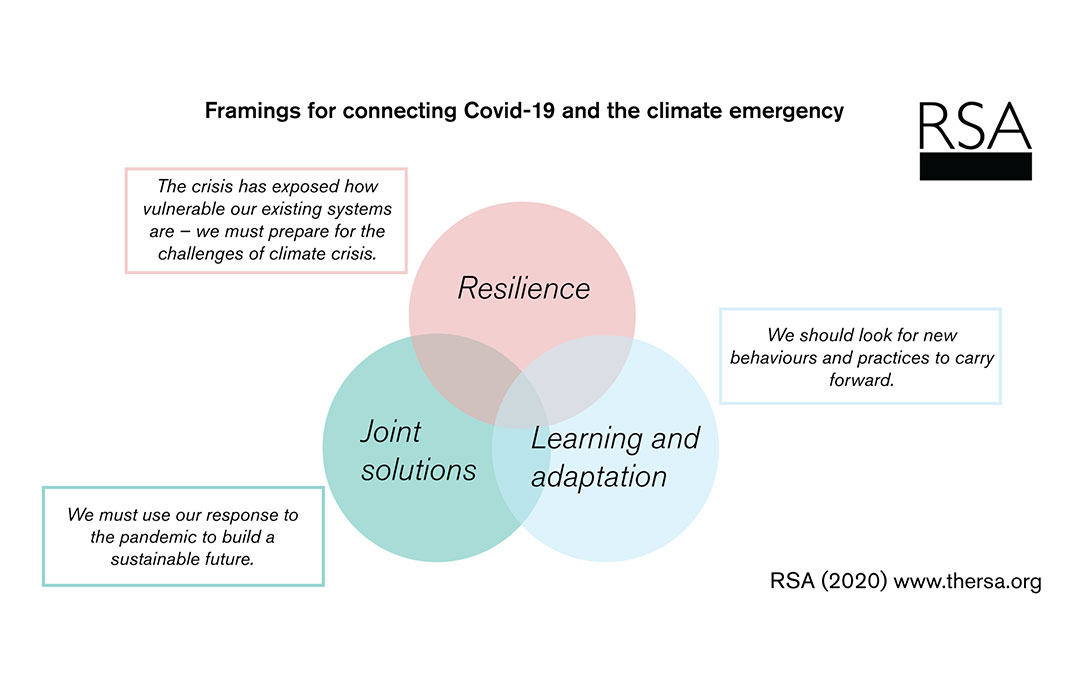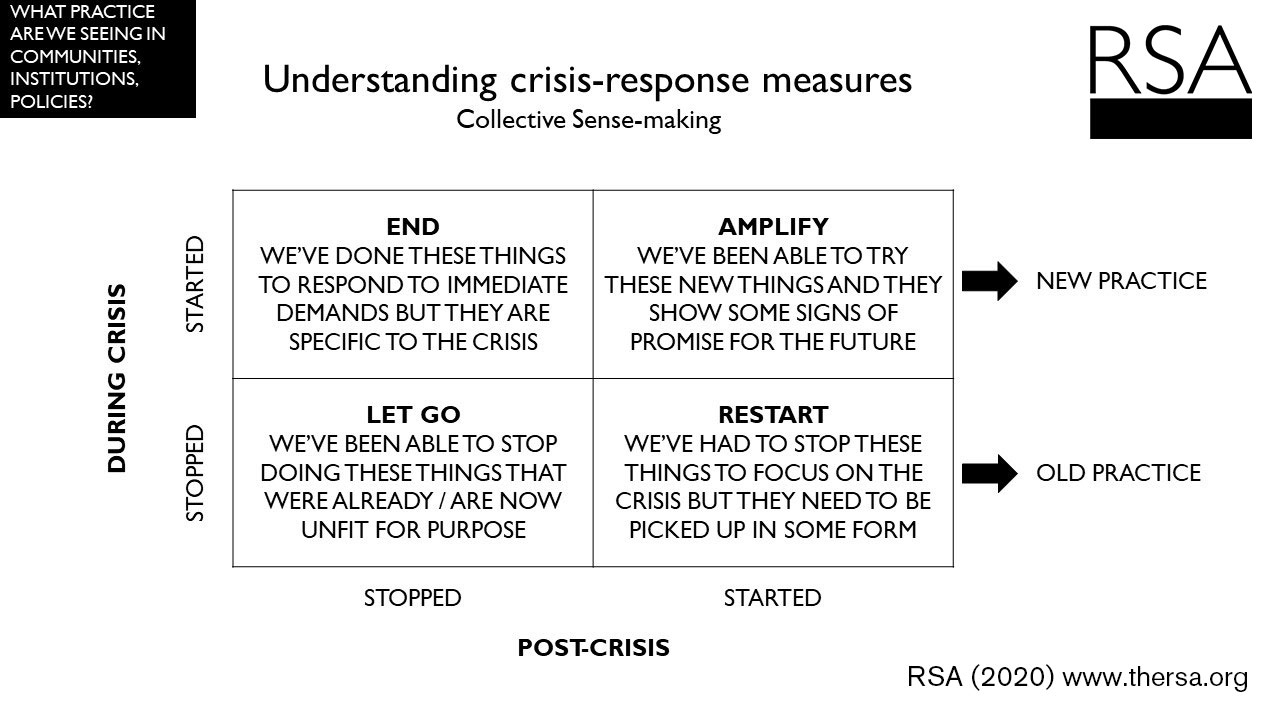As the scale of the impact of Covid-19 on our lives has become clear, people have started to make the obvious comparison to the other global crisis we face - climate change.
As we move into a transition period, the question of how we view the connections between these challenges in the long-term is increasingly critical.
The links we make between issues really matter. As our colleagues have discussed recently on the RSA blog, the way we frame them, the metaphors we use and the stories they tell are important. They not only say something about the way we see the world today, but they actively shape the future.
Over the past few weeks, we have been observing how people and organisations have been articulating the link between Covid-19 and the climate emergency, to understand which narratives might help us emerge from this crisis into a more sustainable future.
We found three narratives that are making the link: Joint Solutions, Resilience, and Learning + Adapting.

Joint Solutions
We must see our response to pandemic within the broader frame of the climate crisis – how can our response now align with the climate agenda?
The most common ‘joint solutions’ approach has been on a ‘green’ stimulus (government spending to grow the economy) or bailout (government support for businesses) - see The People’s Bailout, or The Green Stimulus Proposal. They focus on how money spent to aid recovery could also speed up the transition to a green economy. For example, stimulus to create green jobs that work to tackle the climate crisis, or expand public services that support climate resilience.
Links between the two crises have focussed on this potential win-win. This is important because trying to jumpstart the economy without considering the climate risks reversing the move towards sustainability.
At its core, the joint solutions framing is about bringing together conversations about economic recovery and the of the climate crisis to show politicians and policymakers the benefits of tackling both at once.
This requires careful weaving of environmental, social justice and economic threads. So for organisations working in this space, collaboration is more critical than ever.
This desire to combine and share expertise, to respond to both the social and environmental needs of recovery, is highlighted in this call for mobilisation signed by a huge number of organisations.
There is another, deeper narrative at play in the link between recovery and climate action – that we are all interconnected.
We may be physically distanced at the moment but the things that link humans together - trade, social, political and environmental connections - are arguably easier to see than ever.
If well-articulated, a ‘Joint Solutions’ narrative could make the implications of climate change more tangible and grow our individual and collective resolve to all play out part in tackling it.
Resilience
The crisis has exposed how vulnerable our existing systems are. We need to find ways to make them more resilient, especially in the context of climate breakdown.
Resilience is about how much something – a person, a country, a system – can handle disruption.
It has been an important concept in the climate debate. It describes how development and growth must be able to cope with increased disruption from climate impacts. For example, will global food supplies deal with increased drought?
Resilience resonates during the pandemic because it is fundamentally about how we withstand and recover from disruption – like the disruption we are all feeling now.
Practically speaking, building climate resilience means building systems that can cope with, whilst not contributing to, climate breakdown – more small-scale, domestic production capacity for example.
The resilience framing is effective at highlighting existing vulnerabilities and drawing focus to the challenges of the future.
But it’s important to understand that resilience isn’t just about being able to quickly bounce back to a previous steady state. It’s about acting in a way that gives us capacity to adapt and evolve to new challenges that arise.
Learning and adapting
The Covid-19 crisis has required us to come up with new ways of doing things – we can learn from these and use them to adapt the way we tackle climate change.
As all of us have experienced over the last two months, Covid-19 requires adaptation. At the global, local, and individual level, we’re trying new things. Some will be useful going forward, and other won’t.
The learning framing between Covid-19 and climate encourages reflection, with the aim of producing more innovative approaches to the challenge of the climate crisis.
The RSA has produced a model to help organisations apply the learning and adapting frame and think through how their Covid-19 responses might play out in the future:
By focussing on building our understanding of the adaptations that could help us in the longer term – for example formalising new norms of scientific collaboration – we might be able to learn the conditions required for encouraging them.
Building Bridges to the Future
We face no greater long-term problem than the climate crisis.
While there are direct links between this pandemic and our relationship with the environment (such as the possible links between animal consumption and virus transmission), there are also some significant differences between the crises.
Most notably in pace and complexity. Our response to climate change could be likened to the fable of the boiling frog, watching as change happens around us but never with a sense of urgency that comes with the shock of scalding water.
Covid-19 by contrast has brought about change at scale in a matter of months, something which hardly seemed possible.
With coronavirus too, there is a clear and simple cause (and blame). With climate, and wider environmental challenges, however, the complexity of causes, feedback loops and interactions encourage inaction.
In the unique conditions created by the pandemic, we have the opportunity to make sure that the narratives we use to talk about climate are as relevant and effective as possible.
The narratives linking Covid and climate above are developing rapidly as organisations and communities’ views evolve. We will be tracking them over the next few months.
All 3 are are ways of making sense of the world but also calls to action.
At the RSA, we are bringing together our ideas around the call to ‘respond at scale, build bridges to the future’.
Over the next weeks we will be highlighting practical interventions that respond to the weaknesses exposed by the pandemic, but also build our capacity to respond to and cope with the challenges of the climate crisis. Interventions that hold promise for building the infrastructure - material, socio-political – to enable us to respond jointly to the social and environmental challenges of the present and future.


Join the discussion
Comments
Please login to post a comment or reply
Don't have an account? Click here to register.
The most obvious link is China (COVID and Carbon economy pollution) and to a lesser extent INDIA. Combined 25% of total CO2 world production. Perhaps BRIC economies in general reperesent bad growth. UK contributes less than 1% to industrial CO2 and has net-zero targets for 2030, and full zero for 2050. Also improving COVID success, given it is now a permanent endemic disease, like flu, and yet our high vaccine rates give 95% or better protection from serious illness and death. All of our successes are technology-driven, exploiting new manufacturing and new digital-based systems coupled with sustainable energy solutions. RSA needs more of these UK Manufacturing and Commerce success stories please.